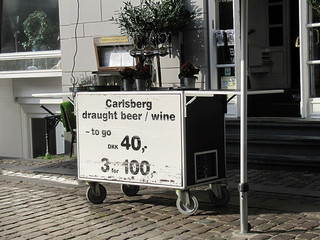Here Today, Gone Tomorrow: Urban Pop-Up Shops
What are pop-up stores and why should you take notice of them in your city
By: Julienne Bay, Staff Writer
Ever walk down the street and notice flyers for the next pop-up shop, bar or eatery? They seem to be everywhere around the city, and they show no signs of slowing down.
We’re talking about pop-up shops: temporary retail “gigs”. They may be open anywhere from a few hours to a few months. They may focus on one particular label or sell items made by a collective team of artists/designers. The idea of a temporary shop isn’t all that new. Just think about the Halloween and Christmas shops that we see each year.
So, what’s the buzz?
“It’s more exciting,” says Jebril “Fresh” Jalloh, the owner of Get Fresh Company. “It’s something new [for the customers], only available for limited time.”
Get Fresh Company is located at 498 Queen St. W. in the very hip, urban corner of Bathurst St. and Queen St. W of Toronto. Although it is a permanent store, Jalloh hosts series of pop-up events that represent a particular label. Just last April, Jalloh hosted a pop-up shop event for “Raised by the Wolves,” a Canadian streetwear collection.
“The brand gets a lot of exposure, a lot of hype promoted through a bunch of different channels, so a lot of people will know about the brand,” says Jalloh. “The only disadvantage is that people can’t come every day to buy your stuff…but if you’re smart about it, you’ll promote your online store at the pop-up shop.”
These shops are also for individual artists and designers, who simply want to show off their community’s creativity. City of Crafts, a group consisting of several artists, rent store space in Toronto each year to sell all things local and handmade. For those that want to buy unique items, things sold in pop-up shops will likely be hard to find again once the doors close. For most of these items, there are no labels, brands or even online shops.
“This is kind of a one-time thing for a lot of people,” says Rosalyn Faustino, a participating artist. “A lot of times, the people don’t normally sell [their items] in shops… As for me, I’ve only done maybe two pop up shops, and I don’t sell anywhere.”
And consumers agree that pop-up shops provide shopping experience that’s quite different from that of big box stores.
[pullquote]“It’s something new for the customers, only available for limited time.”[/pullquote]
“It allows you to have something unique,” says Julie Song, a university student from Toronto. “Not only is it a novelty in a sense, I think it allows people to be a part of what’s in and what’s not.”
Pop-up shops also provide opportunities for business owners to test their consumer market before fully committing to a permanent store.
“There are also people with good ideas, with little money, so they want to test it,” says Gay Stephenson, a landlady who has rented out her store space in the Danforth area to pop-up shops in the past. “And for those with online stores, it’s great to have opportunity to have a real store.”
Sauvage, a stylish boutique shop located at 644 Queen St.W. Toronto, did a bit of research for six months with a pop-up location in March 2012, before setting up a permanent location.
“We always knew that we were going to the permanent location, so it was a great segue to the permanent location,” says Jaya Kahlon, the owner of Sauvage. “Definitely, a pop up allows you to get to know the customer, before making a big investment in a permanent store.”
[pullquote]“A pop up allows you to get to know the customer, before making a big investment in a permanent store.”[/pullquote]
Of course, there are disadvantages to owning a business that seemingly requires less commitment than a permanent store.
“A permanent store gives you a place for the customers to come back and really cultivate your customer’s needs and cultivate the whole concept,” says Kahlon. “So when we moved to the permanent store, we were able to decorate the place to reflect our brand. We were really able to put our stamp on everything in a way that we weren’t able to do with a pop-up.”
Moreover, many landlords prefer long-term rentals over short-term rentals.
“Short-term rentals are not ideal,” says Stephenson. “If the space is going to be empty anyway, it’s better to have something than nothing. It’s a nice way to fill it up and wait for the next tenant…it’s all very positive for your actual space, for renting out in the future.”
So, what are you waiting for?
Do you have an exciting business idea, but are not sure how it would work out in the consumer market? Maybe it’s your turn to join the pop-up retail trend. Keep in mind, though, that short-term business commitment isn’t necessarily easier than a permanent business set up.
“It’s really stressful, but you will get that instant exposure,” says Faustino.
And if you’re looking for an exciting, limited-edition consumer experience, find out where the next pop-ups are popping up in your area.
“It’s happening almost every week,” says Faustino. “Even here [on this street]…there are so many already.”
Tips on getting started with your own pop-up business

Image courtesy of Loozrboy via Flickr
Location
Get to know the neighbourhood. What is the demographic? A baby boutique certainly won’t do well in an area full of university students.
It helps to look at other shops in the area, or noting what type events are held in the neighbourhood. Who are they geared toward? What would these people need to purchase? Moreover, what would they want to purchase? What is an average income in the area? These things all come into a factor when picking a location.
Idea
Come up with a solid, innovative idea. What will your shop have that others don’t? Our thirst for newness and excitement has no limit. See all those boutique salons for dogs? We’re not just talking about traditional retail shopping. There are pop-up taco stands, bars, lingerie shops among everything else you can imagine.
[pullquote]What do your customers care about? If you can answer that question, you certainly can find an angle for your promotional event.[/pullquote]
“In any business, the minute your competition has a new product or innovation that you lack, you suddenly will become in danger of going out of business,” says Nicholas Wen Shea, owner of NWS Promotions, an online custom apparel shop and Sky Trading Co., a gift shop at 229 Spadina Ave. Toronto.
Budget
Sure, running a temporary business is a lot cheaper than a permanent one, but it’s not free. How much will the rent be? Will you hire temporary staff, or will you round up volunteers?
How much are you willing to invest, and how much do you expect to earn? It’s also important to remember that sales can exceed one’s expectations; but many times, it can be the other way around.
“When you don’t budget carefully, it is especially likely for a small business to fail,” says Shen. “When sales are unpredictably slow…small businesses tend to struggle more because they don’t have the cash-flow to maintain rent and overhead expenses.”
Network
“Use Facebook, Twitter, Instagram…And you need to know certain people. Certain shops will put the ads on their walls,” says Faustino.
Building a network is important, whether it’s through social media, or simply in person by attending other similar events.
“I definitely met a lot of other vendors, and you get a lot of network,” says Faustino, who participated in City of Craft’s pop-up event this year. “There’s a small community, where people will find out [about your event].”
Promote
So, you’ve made some friends through networking. Now what? Why would they want to actually show up? …right, the party.
“We do one day for a pop up shop, and we’re sponsored by Hennessey,” says Jalloh, the owner of Get Fresh Company. “So there’s free liquor all day, and people can come out.”
Booze isn’t the only way to promote your pop-up business. It’s all about making it into a special event. What do your customers care about? If you can answer that question, you certainly can find an angle for your promotional event.
City of Craft, for example, is all about supporting the crafty community of the city.
“A lot of people in Toronto really support the local artists,” says Faustino. “The energy of the show is great.”
Julienne Bay is a j-student from Toronto. As an avid traveller, coffee-drinker and documentary junkie, she’s constantly trying to figure out what it means to be human.
Source
Jebril “Fresh” Jalloh, Get Fresh Company
Rosalyn Faustino
Jaya Kahlon, Sauvage
Gay Stephenson
Julie Song, University of Toronto student
Nicholas Wen Shea, SKY Trading Co./NWS Promotion
Image courtesy of Across & Down via Flickr
Image courtesy of Loozrboy via Flickr
Image courtesy of Pop Culture Geek via Flickr
































Share the post "Here Today, Gone Tomorrow: Urban Pop-Up Shops"